- Home
- Georgette Heyer
Venetia Page 29
Venetia Read online
Page 29
‘None was offered me!’ Venetia said, standing very straight and still in the middle of the room.
‘No, my love, I know, but although it seems a dreadful thing to say, to have married him would have been worse! At least, I don’t precisely mean –’
‘Don’t distress yourself, ma’am! Lady Denny was mistaken. Lord Damerel’s affections – were not so deeply engaged as she supposed. There was nothing more between us than – a little flirtation. He made me no offer – of any kind!’
‘Oh, my poor, poor child, don’t!’ cried Mrs Hendred. ‘No wonder you should be so wretched! There is nothing so mortifying as to fall in love with someone who does not share one’s sentiments, but that pain you need not be made to suffer, whatever your uncle says, for gentlemen don’t understand anything, however wise they may be, and even he owned to me that he had been mistaken in Lord Damerel, so he may just as easily be mistaken in you!’
‘Mistaken in Lord Damerel?’ Venetia interrupted. ‘Then – Aunt, are you telling me that my uncle saw Damerel when he came to Undershaw?’
‘Well, my love, he – he thought it his duty, when you have no father to protect you! He considered it most carefully, not at first perceiving how he might be able – But then you wrote me the news of Conway’s marriage, and it was the most providential thing that ever happened, though I was never more shocked in my life, for it furnished your uncle with an excellent excuse to remove you from Undershaw, which he saw in a flash, because he is very clever, as I daresay anyone would tell you.’
‘Good God!’ Venetia said blankly. She pressed a hand to her brow. ‘But if he saw him – Yes, it must have been before he reached Undershaw – before I saw – Aunt, what passed between them? You must tell me, if you please! If you will not I shall ask my uncle, and if he will not I’ll ask Damerel himself!’
‘Venetia, don’t talk in that dreadful way! Your uncle was most agreeably surprised, I promise you! You must not think that they quarrelled, or that there was the least unpleasantness! Indeed, your uncle told me that he felt most sincerely for Lord Damerel, and in general, you know, he never does so. He even said to me that it was a great pity that it should be out of the question – the marriage, I mean – because he was bound to acknowledge that he might have been the very – But it is out of the question, my dear, and so Lord Damerel himself acknowledged. Your uncle says that nothing could have done him greater credit than the open way he spoke, even saying that he had done very ill in not going away from Yorkshire, which your uncle had not accused him of, though of course it is perfectly true. Your uncle was not obliged even to point out to him, which he had expected would have been the case, and a very disagreeable task it would have been, and I’m sure I don’t know how – but that doesn’t signify, because Lord Damerel said that he knew well that it would be infamous to take advantage of you, when you knew nothing about the world, and had never been beyond Yorkshire, or met any other men – well, only Mr Yardley! – so that you were almost bound to have fallen in love with him, and how could you understand what it would mean to be married to a man of his reputation? And you don’t understand, dear child, but indeed, indeed it would be ruinous!’ She paused, largely for want of breath, and was relieved to see that the colour was back in Venetia’s cheeks, and that her eyes were full of light. She heaved a thankful sigh, and said: ‘I knew you would not feel so badly if you didn’t think yourself slighted! How glad I am that I’ve told you! For you are not so unhappy now, are you, my love?’
‘Unhappy?’ Venetia repeated. ‘Oh, no, no! Not unhappy! If I had only known – ! But I did know! I did!’
Mrs Hendred did not quite understand what was meant by that, nor did she greatly care. All that signified was that the haunted look which made her so uncomfortable had vanished from Venetia’s eyes. She gave a final wipe to her own, and beamed upon her suddenly radiant niece, saying with satisfaction: ‘One thing you may plume yourself on, though, of course, it will not do to say so, for that would not be at all becoming. But to have captivated such a man as Damerel into actually wishing to offer for you is a triumph indeed! For he must have meant to reform his way of life, you know! There was never anything like it, and I don’t scruple to own to you, my love, that if it had been one of my daughters I should be as proud as a peacock – not that I mean to say I think any of them could, though I fancy Marianne may grow to be a very handsome girl – and, of course, I should never dream of letting him come in their way!’
Venetia, who had been paying no attention, exclaimed: ‘The wretch! The idiotish wretch! How could he think I should care a jot for such nonsense? Oh, how angry I am with the pair of them! How dared they make me so unhappy? Behaving as though I were seventeen, and a stupid little innocent! My dear aunt – my dear, dear aunt, thank you!’
Mrs Hendred, emerging from an impulsive embrace, and instinctively putting up a hand to straighten her cap, began to be uneasy again, for not even her optimism could ascribe the joy throbbing in Venetia’s voice to mere pride of conquest. ‘Yes, dear child, but you are not thinking – I mean, it cannot alter anything! Such a marriage would utterly ruin you!’
Venetia looked down at her in a little amusement. ‘Would it indeed? Well, ma’am, when Damerel came north it was to escape the efforts of his aunts to marry him to a lady of respectable birth and fortune, so that he might become reestablished in the eyes of the world. I don’t see how that was to be achieved if marriage to him meant her social ruin, and I can’t believe that the plot was being hatched without the knowledge and approval of Miss Ubley’s parents!’
‘What?’ cried Mrs Hendred, momentarily diverted. ‘Amelia Ubley? You don’t mean it!’
‘But I do mean it, so now, ma’am, will you explain to me how it comes about that though her credit would survive that marriage mine would not?’
Mrs Hendred’s brief period of relief was over. She stared at her niece with an expression on her face of absurd chagrin, fidgeted with her shawl, started several sentences, and finished none, and finally answered lamely: ‘The cases are not the same. Oh dear, now I wish – Venetia, you don’t understand these matters! Miss Ubley’s situation – the circumstances – Well, they are quite different!’
‘In what way?’
‘Oh – oh, in a hundred ways! Good gracious, for one thing she’s more than thirty years old, with a deplorable figure, besides a pug-nose, and she has a way of poking herself forward when she walks, and – oh, she was at her last prayers years ago! No one could blame Latchford for being thankful to accept any offer for her, particularly if the Damerel ladies mean to make him their heir, which wouldn’t surprise me in the least, now I come to think of it. And although I don’t mean to say Miss Ubley is not respectable, for she is dowdily respectable, naturally she cannot be thought an innocent, at her age, and having always lived in town, so that she must be up to snuff, as they say! But in your case, my dear, everyone knows what your circumstances have been, and how you cannot possibly have had any experience! And,’ she added, with a flash of inspiration, ‘if Damerel were to marry you, everyone would say that it was the wickedest thing imaginable, and the most shocking take-in! I assure you, my love, there is something particularly repugnant in the marriage of a rake to a beautiful girl, years younger than himself, and perfectly innocent, as you are, my dear, whatever you may choose to say!’
At the start of this speech a disquietingly confident smile glinted in Venetia’s eyes, but by the time Mrs Hendred reached her triumphant conclusion it had faded. Anxiously observing her, Mrs Hendred was thankful to see that she was now looking thoughtful, slightly frowning.
Mrs Hendred decided to pursue her advantage. ‘You, dear child, are not aware of the way such things are looked upon – indeed, I don’t know how you should be, any more than a nun! – but you may depend on it that he is!’
Venetia glanced at her. ‘Yes,’ she said slowly, remembering that interrupted scene in the library at Undershaw, and h
ow troubled she had afterwards been by Damerel’s reluctance. You don’t realise what an advantage I should be taking of your innocence! he had said. ‘Yes,’ she repeated. ‘I begin to see now…’
‘I was persuaded you must, for you have such excellent good sense, my love!’ said Mrs Hendred, much heartened. ‘I know how it seems to you now, but you may believe me when I tell you that these things don’t endure. Oh, dear! I thought I should have died of despair when Mama – your grandmama, my dear – and Francis made me give up poor Sebastian! I cried for three days without ceasing, but in the end, you know, I was married to your uncle, and I am sure nothing could have been more comfortable!’
‘Did you never regret, ma’am?’ asked Venetia, looking curiously at her.
‘Never!’ declared Mrs Hendred emphatically. ‘It would have been a shockingly bad match: he had no fortune – hardly a feather to fly with! Only think how disagreeable that would have been! Yes, and that puts me in mind of another thing, my love! Everyone says that Lord Damerel has brought a noble to ninepence with his extravagant ways, which makes him quite ineligible! Naturally, had he been wealthy the case might have been different, for, after all, a handsome fortune – But he has brought his to a nutshell, so there is nothing whatsoever to recommend him, and so he knows, for he said so to your uncle. You would be throwing yourself away, and though I myself very much doubt whether it can be brought about, he and your uncle are both of the opinion that you will make a splendid marriage. And no one, my dear niece, would be more pleased than I should be if you did!’
‘No one, however, would be less pleased than myself, ma’am.’
‘It is very proper you should say so,’ said Mrs Hendred approvingly. ‘Nothing is more unbecoming in a girl than to appear mercenary, or on the catch! For my part, I should be happy to see you married to a respectable man, of sufficient consequence, of course, and affluent enough to be able to provide you with the elegancies without which, I do assure you, life would be insupportable!’
Venetia, who had paced over to the window, and back again, said: ‘It is going to be difficult. Yes, I see that now.’
‘No, no, dearest child! Not the least difficulty in the world! I only meant –’
‘To whistle happiness down the wind for a scruple!’ Venetia said, unheeding. ‘To me that seems so absurd – so addle-brained – ! But that’s what he did, and if he has made up his mind to be idiotishly noble – Yes, it is going to be very difficult. I must think!’
Quite forgetful of her aunt, she went quickly out of the room, leaving that harassed lady to reflections which were as uneasy as they were puzzled.
Eighteen
Venturing, rather later, to renew her protests against the hiring of a house in Hans Town, Mrs Hendred was at first thankful to discover that Venetia had abandoned her fell purpose, and then, when she had thought it over, apprehensive. She could not bring herself to believe that any representations of hers had brought about this sudden change; and the more she considered the matter the less did she like her niece’s readiness to relinquish a scheme to which she had all but committed herself. It had seemed almost as though she had forgotten the house in Hans Town, for upon the subject’s being broached she had stared for a moment, and then had said: ‘Oh – ! That! No, no, ma’am, don’t be in a worry! I daresay you are quite right, and I shouldn’t like to live there at all.’
Mrs Hendred, with every reason to be satisfied with this answer, felt vaguely alarmed. It seemed to her not only that Venetia’s thoughts were far away, but that she was weaving some new plan. An attempt to discover what this might be failed: Venetia merely smiled, and shook her head, which made it seem unpleasantly probable that the new plan would prove to be quite as shocking as the old. Mrs Hendred began to wish that her austere spouse had not gone into Berkshire; and during an unusually wakeful night even reached the stage of wondering whether it would not be as well to send a letter to him express. In the morning this desperate resolve seemed as foolish as it was imprudent, for what, after all, could Venetia be contemplating that would justify a summons to her uncle? Such a summons would displease him quite as much as the inevitable disclosure that his wife had told Venetia precisely what he had thought it best she should never know, for he had gone into Berkshire to attend the Quarter Sessions, which, since he was Custos Rotulorum and punctilious in the performance of his duty, he always made a point of doing, generally remaining for a full week. On this occasion, however, he had told his wife that she might expect to see him again within four or, at the most, five days, since he had engaged himself to attend a Party Meeting. Nothing, she thought, could happen in so short a period: in fact, it was hard to see how anything cataclysmic could happen at all. Venetia might be ready to count the world well lost for love, but she could hardly tell Damerel so. And even if she did tell him – not that Mrs Hendred supposed that she would dream of behaving with such gross impropriety, however unconventional she might be – Damerel knew that for a young female of quality the world would not be at all well lost; and he had given Mr Hendred his word as a gentleman that he would not propose marriage to Venetia. So there was really no danger threatening Mrs Hendred’s peace of mind, and the night’s forebodings were possibly to be ascribed to the goose and turkey pie, of which she had partaken a little too freely at supper. Or perhaps it had been a mistake to have eaten mushroom fritters: mushrooms had never agreed with her delicate constitution, so she must remember to send a message to the artist ruling over her kitchens that they must in future be excluded from his luscious recipes.
While Mrs Hendred’s mind was drifting into gastronomy Venetia’s was employed in forming and discarding schemes for achieving social ruin. Quite as quickly as her aunt she had decided that to tell Damerel how little she cared for the world, or its opinion, would serve no useful purpose. He had from the start called her his green girl; instinct warned her that he would not think her matured by one month’s sojourn in London. She thought, but tenderly, that for all his wide experience of women he was as stupid as Edward Yardley, or her clever uncle. Because she had her knowledge of the world at secondhand he believed she knew her own heart not better, and had apparently convinced himself that within a measurable time of being plunged into fashionable circles she would not only be thankful to have escaped from – what had he called it? – the devil’s own scrape, but would be happily engaged to some virtuous young gentleman of birth, fortune, and consequence. That was bad enough: far worse – or, at any rate, more difficult to overcome – was the aspect put before her by her aunt. A worldly man, he knew what the world’s opinion would be of his marriage to herself: not only knew it, but shared it. He had told her that his depravity had stopped short of tampering with the young and innocent: marriage had not been his context, but she guessed that in just such a light did he regard it. He had placed her above his touch, and how to demonstrate that she was well within it was a problem that she could see no way of solving. She remembered that it was her plan of setting up house with Aubrey which had so nearly broken down his resolution. Anything were better than that! he had exclaimed. For a little while she played with the idea of immediately hiring the house in Hans Town, and writing off to tell Aubrey that she had done it. But that scheme was soon discarded with all the others, because she could not be quite sure that it was out of his power to scotch it. He had more influence over Aubrey than she had chosen to admit to Edward; moreover, since he seemed to have discussed her future with her uncle, he might rely on Mr Hendred to scotch it for him. In course of time he could be made to realise that she preferred spinsterhood to the brilliant match he apparently believed to be her destiny, but she neither wished to languish until public opinion placed her on the shelf, nor did she cherish illusions about her love: not for him the life of a celibate, mourning his lost bride: he was very much more likely to seek forgetfulness in excess, and would probably be next heard of flaunting some dazzling lightskirt all over Europe. For the moment he was tied to Yorkshi
re by Aubrey’s presence in his house; but any day now Aubrey would leave the Priory, and then, Venetia thought, he would be lost to her indeed.
Her fears and schemes left little room in her mind for minor considerations. She responded mechanically to her aunt’s suggestions for the day’s pleasures; accompanied her dutifully on a shopping expedition, and to a concert; her brain in a ferment while her lips uttered inane civilities. Mrs Hendred, finding her in so complaisant a mood, brought up the subject of Edward’s projected party again, and was delighted to meet with no opposition. She suspected that Venetia hardly realised what had been said to her, but she was determined to hold her to the word she had given so abstractedly. Edward had invited them to dine at the Clarendon Hotel, and in Mrs Hendred’s opinion this lavish gesture could not fail to recommend him to Venetia. The best and most expensive dinner in town was to be had there, for the cook was a Frenchman, and not less than £4 was the cost of quite a simple repast. Edward had invited Mr Hendred too, but seldom had that dyspeptic gentleman refused an invitation with less regret. French dishes were no treat to him, and he had taken Edward in aversion. He said that a man who was prosy before he reached his thirtieth year would be intolerable long before he attained his fortieth; and that Venetia could do very much better for herself. So the party numbered three persons only, Edward having no acquaintance in town, and Mrs Hendred not choosing to fill her husband’s place from her own large circle of friends. Even quite elderly gentlemen were more than likely to put forth their best efforts to captivate Venetia, and she wanted to introduce no rival to Edward into his party.

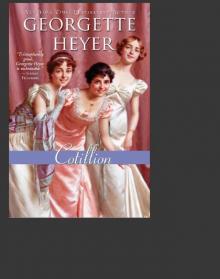 Cotillion
Cotillion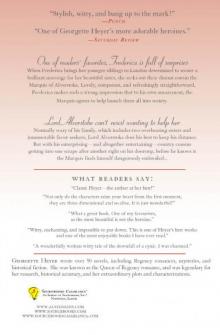 Frederica
Frederica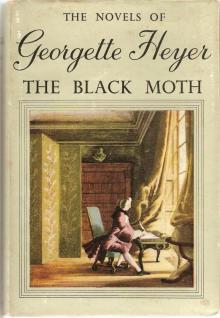 The Black Moth: A Romance of the XVIIIth Century
The Black Moth: A Romance of the XVIIIth Century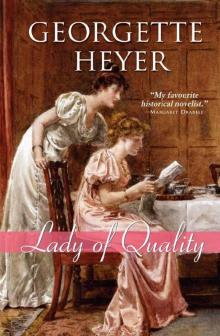 Lady of Quality
Lady of Quality Snowdrift and Other Stories
Snowdrift and Other Stories An Infamous Army
An Infamous Army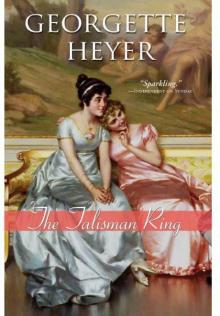 The Talisman Ring
The Talisman Ring Venetia
Venetia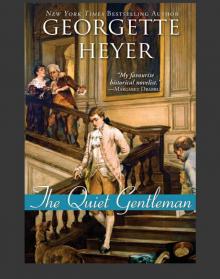 The Quiet Gentleman
The Quiet Gentleman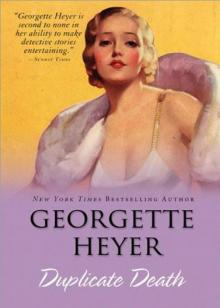 Duplicate Death
Duplicate Death Cousin Kate
Cousin Kate Black Sheep
Black Sheep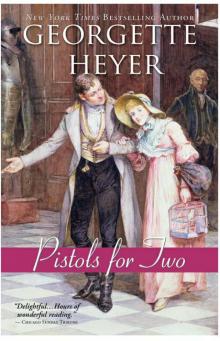 Pistols for Two
Pistols for Two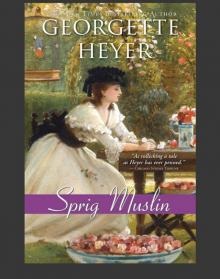 Sprig Muslin
Sprig Muslin No Wind of Blame
No Wind of Blame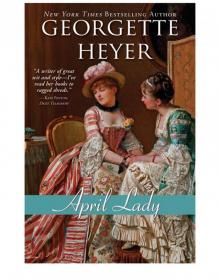 April Lady
April Lady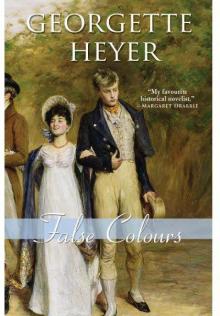 False Colours
False Colours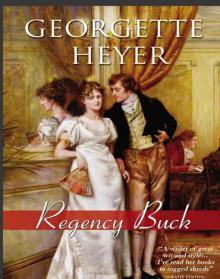 Regency Buck
Regency Buck The Toll-Gate
The Toll-Gate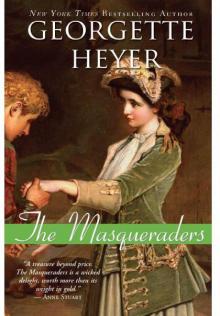 The Masqueraders
The Masqueraders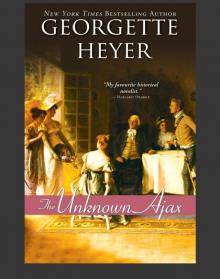 The Unknown Ajax
The Unknown Ajax The Grand Sophy
The Grand Sophy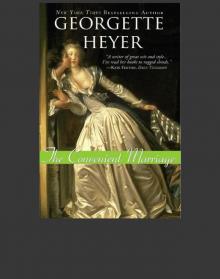 The Convenient Marriage
The Convenient Marriage Faro's Daughter
Faro's Daughter The Conqueror
The Conqueror The Foundling
The Foundling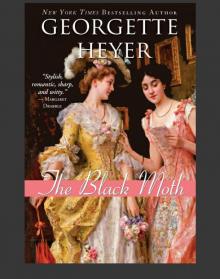 The Black Moth
The Black Moth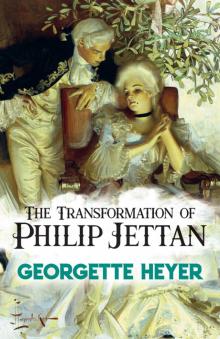 The Transformation of Philip Jettan
The Transformation of Philip Jettan Friday's Child
Friday's Child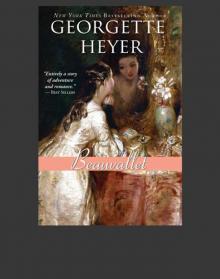 Beauvallet
Beauvallet They Found Him Dead
They Found Him Dead Charity Girl
Charity Girl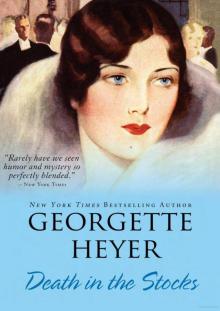 Death in the Stocks: Merely Murder
Death in the Stocks: Merely Murder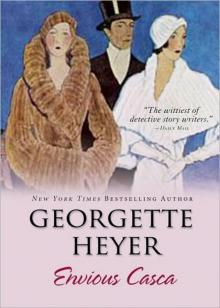 Envious Casca
Envious Casca Behold, Here's Poison
Behold, Here's Poison Arabella
Arabella The Nonesuch
The Nonesuch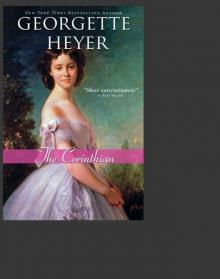 The Corinthian
The Corinthian Jennifer Kloester
Jennifer Kloester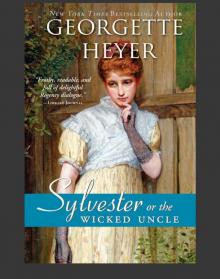 Sylvester
Sylvester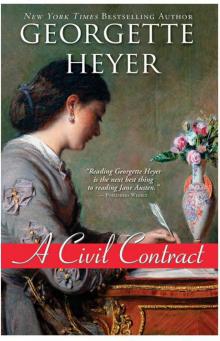 A Civil Contract
A Civil Contract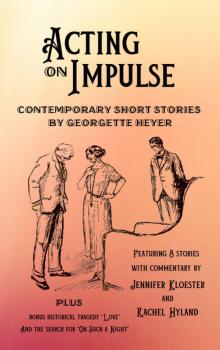 Acting on Impulse
Acting on Impulse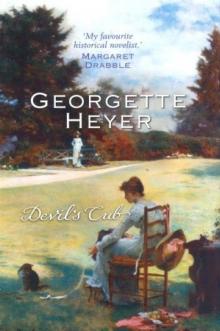 Devil’s Cub at-2
Devil’s Cub at-2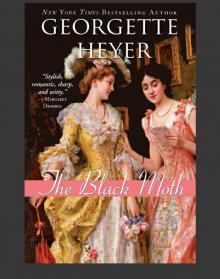 Black Moth
Black Moth Grand Sophy
Grand Sophy Instead of the Thorn
Instead of the Thorn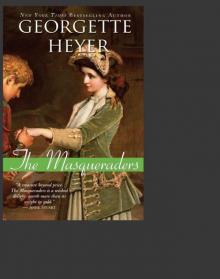 Masqueraders
Masqueraders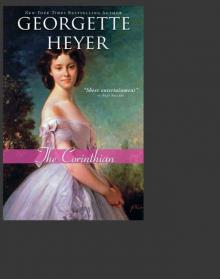 Corinthian
Corinthian Reluctant Widow
Reluctant Widow